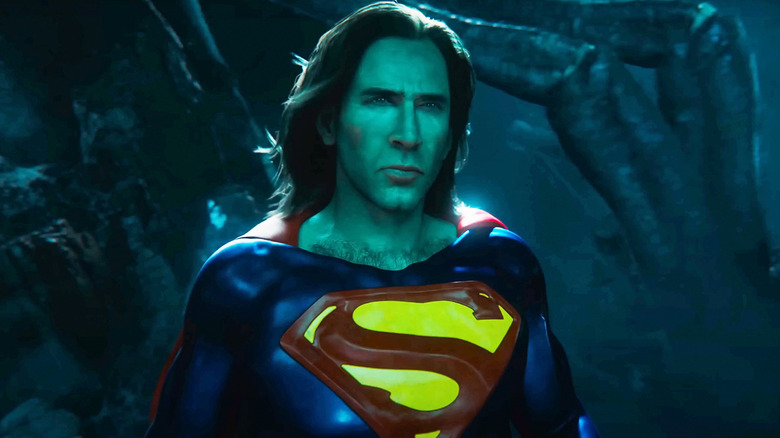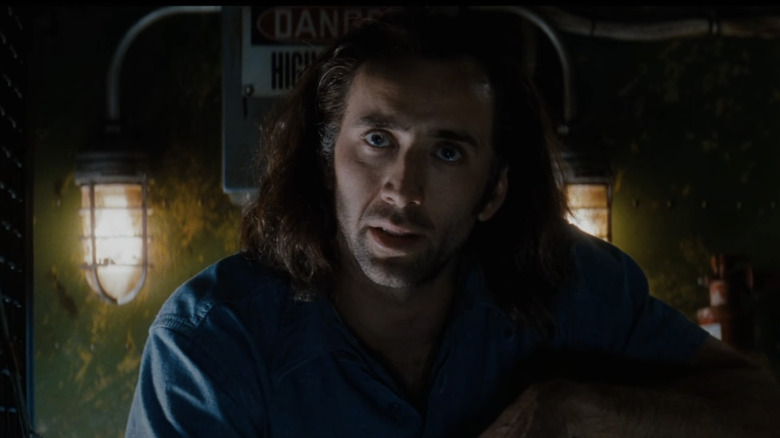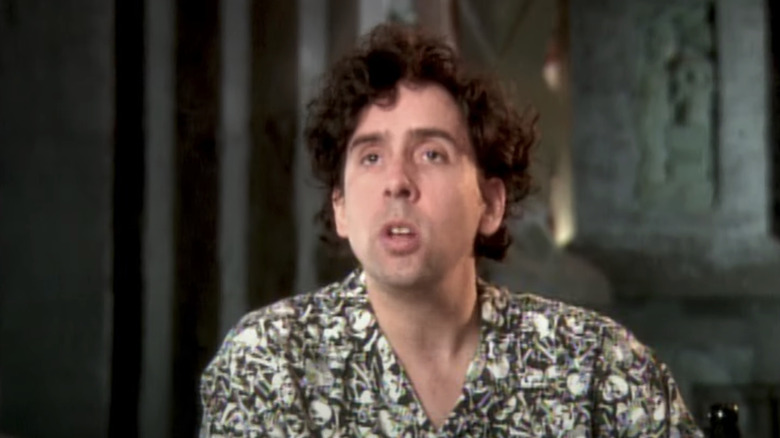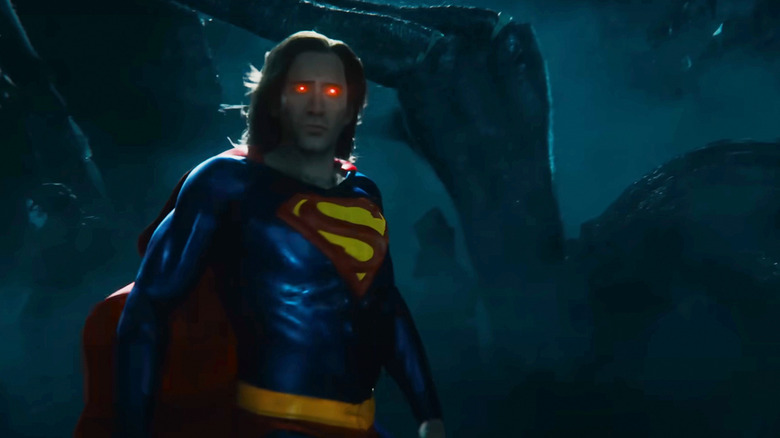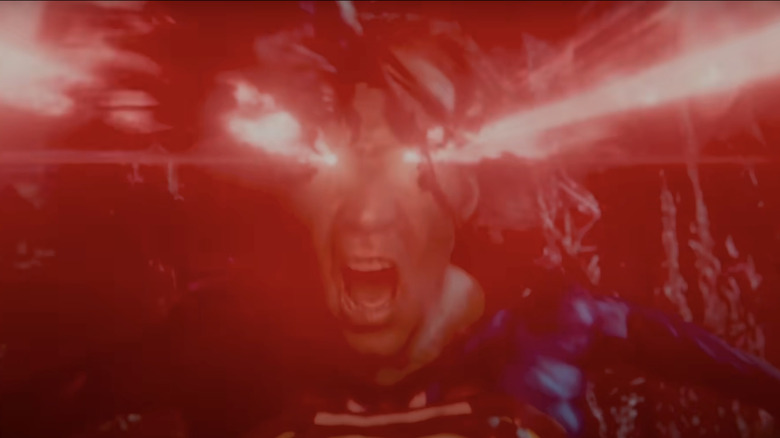Why Nicolas Cage's Superman Lives Was Canceled
We may receive a commission on purchases made from links.
Anyone who saw the box office disaster of super-heroic proportions that was 2022's "The Flash" will surely remember CGI Nicolas Cage cropping up during Barry Allen's multiversal exploits. Aside from the fact that the CGI rendering left a lot to be desired, this uncanny cameo, in which Cage's Superman faces off against a giant spider, probably struck many as just a tad bizarre, considering it seemed to come out of nowhere. But for those unaware of the doomed "Superman Lives" movie, this ill-advised moment in "The Flash" was actually a nod to a notorious chapter in DC's cinematic history.
Tim Burton restored the image of Batman as a dark vigilante in the public's collective consciousness with his two movies, 1989's "Batman" and 1992's "Batman Returns." After the dark expressionist nightmare that was "Returns" upset a bunch of kids and made McDonalds rethink their Happy Meal tie-in marketing, however, Warner Bros. decided to oust Burton in favor of Joel Schumacher, leaving the "Beetlejuice Beetlejuice" director free to pursue other passions — one of which was the commerical disappointment that was 1997's "Mars Attacks." Luckily, Warner Bros. was also working on rebooting Superman, and Burton needed a win.
Buoyed by the success of Burton's Batman movies, the studio had decided to reintroduce a cinematic Superman to the masses. It started in 1993 when the company bought the rights to the character from producer Alexander Salkind. Though Salkind and director Richard Donner had successfully brought the Man of Steel to the big screen with 1978's "Superman," the franchise had declined with each subsequent entry, until the dismal "Superman IV: The Quest for Peace" (the worst Superman movie according to IMDb) killed it altogether in 1987.
With Burton's Batman success, however, Warner Bros. was sure somebody could do the same with Supes, and even took out ads to let fans know they were working on a new Superman movie before any sort of production had even begun. The company hired "Batman" producer Jon Peters to shepherd the new project and set to work on bringing a cinematic Man of Steel to a whole new generation. Unfortunately, the entire development and production process was fraught with all manner of issues, until the movie was eventually scrapped altogether.
Superman Lives had a troubled production from the very beginning
After Warner Bros. regained the rights to Superman, the company initially hired Jonathan Lemkin to write the "Superman Lives" script. Lemkin was known for his work on TV series "21 Jump Street" and "Beverly Hills 90210," and would go on to write "The Devil's Advocate" and "Lethal Weapon 4." But Warner Bros. wasn't thrilled with his take on Superman, and felt that much of Lemkin's script hewed too closely to Joel Schumacher's (overlooked and groundbreaking) "Batman Forever" in terms of its thematic elements.
So, the studio conscripted a new scenarist in the form of Gregory Poirier, who reworked the story entirely, only for Warners to then hire Kevin Smith to write a new version. Before any kind of pre-production had even started, then, "Superman Lives" had gone through various versions, none of which seemed to really excite the Warner executives. After Smith told the studio what he thought of Poirier's script, they allowed him to once again start from scratch, though they also mandated he include the death of Superman so as to capitalize on the big comic book event of 1992, wherein Supes met his demise at the hands of Doomsday in a now legendary moment.
Smith did his best to work within the parameters he'd been given and turned in a first draft in 1996. Finally, things seemed to be going well for "Superman Lives," and the "Clerks" director delivered a second draft the following year. Meanwhile, Nicolas Cage had reportedly been impressed with Smith's script, and was enjoying a moment in the spotlight thanks to his work in big-budget blockbusters such as "Con Air" and "The Rock" (which might just be a secret James Bond movie according to one theory). It seemed then that the movie finally had a decent script and a star, but this was really just the beginning of the "Superman Lives" debacle.
Nobody was really in charge of Superman Lives
When Warner Bros. finally got their hands on the Superman rights and were able to produce a movie based on such a massive IP, the studio knew the potential profits that awaited. Ever since "Batman" changed movie marketing forever in the summer of '89, sparking what has since become known as "Bat-mania," the studio was more than cognizant of the potential revenue that a movie of this sort could generate, particularly in terms of merchandise and toy sales. As such, much like with 1997's "Batman & Robin" and to a lesser extent 1995's "Batman Forever," Warner Bros. ensured that everything in the movie was designed to be, to use the industry phrase, "toyetic."
With the studio already having its ideas about how the film should go, toy company requirements, and Jon Peters insisting on his own ideas for the script, the multiple screenwriters hired to pen "Superman Lives" were already up against it when trying to craft some sort of engaging story, let alone a coherent one. When Smith was writing his version of the screenplay, for example, Peters insisted on several of his own ideas, including a grand fight between the Man of Steel and a giant spider — hence the callback in "The Flash." Things only got worse in terms of leadership when a director finally came on board.
Several filmmakers actually turned down Warner Bros.' offer to oversee the film, but there was one director with a demonstrated talent for superhero blockbusters who did accept: Tim Burton. He'd just come off 1997's "Mars Attacks," which wasn't exactly a hit, and was therefore looking for something with a little more in the way of commercial appeal. The Superman movie was apparently the answer, with Nicolas Cage claiming he personally chose Burton to direct "Superman Lives." Unfortunately for Kevin Smith, Burton wasn't all that taken with his script and convinced Warner Bros. to let him make his own "Superman" movie. As Smith told Empire (via Film School Rejects), "So who is Warner Brothers going to back — the guy who made 'Clerks,' or the guy who made them half a billion dollars on 'Batman?'"
In the summer of 1997, four years after Warner Bros. had announced to fans that it was working on a new Superman movie, production offices were set up and "Superman Lives" went into pre-production. It had already been a tumultuous journey just to get to that point, and things didn't get much better afterwards.
Ongoing script issues and spiraling budgets held Superman Lives back
After Tim Burton got the go-ahead to rework "Superman Lives" from scratch, a fourth screenwriter was brought in to overhaul the story from the ground up: Wesley Strick. The movie was subsequently retitled to "Superman Reborn," but Strick didn't escape the pressures faced by his predecessors.
In David Hughes' "The Greatest Sci-fi Movies Never Made," Strick was quoted as saying, "Jon Peters was in constant contact with toy companies, whose deals would help offset the picture's huge expense. [Peters] would occasionally call me to demand that Superman use a certain sort of jet-pack — when he'd temporarily lost his flying ability — or that [villain] Brainiac float above the Earth in a 'Skull Ship' which he'd reach via a shuttle that must have a particular design." This was backed up by artist Sylvain Despretz, who'd been hired to help conceptualize the look of the movie. "Peters was basically running the show like a star producer," he said. "He would come down yelling and saying, 'This is the way I want it,' and make the most ridiculous observations."
With each new draft of "Superman Lives," or "Superman Reborn" as it ultimately came to be known, the budget for the production ballooned, eventually reaching levels that were reportedly between $140 million and $190 million — which is akin to the irresponsible budgets of today's blockbusters – and this was in the late '90s. Warners had already spent a reported $30 million on developing the movie, and the whole thing was very quickly coming off the rails.
Warner Bros. wasn't confident enough in Superman Lives
In 1998, five years after Warner Bros. so excitedly embarked on developing a new Superman movie, the studio closed the production offices of "Superman Lives." By this point, designs had been finalized, costumes created, and even sets built. Tim Burton had chosen Pittsburgh as the basis for his Metropolis, and the script was seemingly finally in a place that Warners, Peters, and the toy companies were happy enough with. So, what was the final nail in the coffin? Well, there were several elements at play beyond the already troubled production.
"Batman & Robin," a film which Kevin Feige thinks is one of the most important comic book movies ever made, arrived in 1998 to a poor reception from fans and critics. Joel Schumacher's extended toy commercial was met with derision and looked as though it had killed off the Batman franchise for good. That didn't exactly inspire confidence in Warner Bros., which was taking a similarly "toyetic" approach with its Superman movie. What's more, the late '90s saw Warners take a safer approach to moviemaking, with co-chairman Terry Semel announcing that the studio would avoid "event" movies and focus on mid-budget fare in an attempt to, well, not go broke — I know you think the worst is over for Warner Bros., David Zaslav, but are you listening? The long-gestating Superman movie simply didn't fit into that picture.
Meanwhile, it seems even after Wesley Strick worked his magic on the script, the executives still weren't totally convinced. By that point, the screenplay had been reworked so much that the budget had already gone way beyond any reasonable point, and as Warner Bros. co-chairman Bob Daly said (via "The Greatest Sci-fi Movies Never Made"), "We didn't have a script we loved, and the budget was too high. When the budget started getting out of control, that's when we decided to pull the plug."
In Strick's recollection, however, Semel read his script and "reacted violently against it." According to the writer, there was "a level of nervousness and second-guessing" surrounding the project throughout its development, which essentially ensured Warners was never going to be completely comfortable with any script. In that sense, "Superman Lives," much like "The Flash" and its awful Nic Cage cameo, was sort of doomed from the outset.
